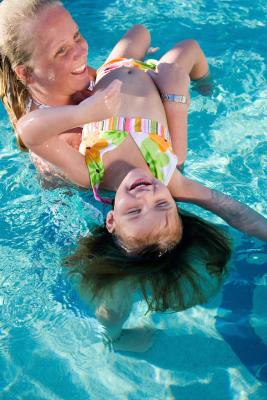Children with physical or developmental difficulties face big hurdles growing up. In addition to dealing with the ordinary stresses kids face in the world, children with special needs struggle to find their place in society. Aqua therapy provides physical benefits and mental benefits to young participants, in a supportive and safe environment.
Location
Most aqua therapy takes place in swimming pools. Public facilities sometimes designate special areas of pools for aqua therapy and have ramps or lifts to permit patrons to get in and out of the pool easily. A dedicated therapy pool allows pool staff to keep water warmer than the 78 degrees F customary for competition lap pools. Water kept at around 90 degrees F keeps patrons who cannot exercise strenuously and have stiff joints or muscles, comfortable.
Features
Aqua therapy takes place year-round in outdoor pools in warm-winter areas and in indoor facilities in colder climates. Aqua therapy usually features supervised classes or personalized therapy sessions with a physical therapy specialist. Class length varies according to the age and abilities of students, and involves basics such as supervised floating and arm and leg extensions or more complex skill building, like swimming under water.
Physical Benefits
Because water insulates and cushions joints and the spine, it is a low-impact environment for exercise and therapy. Children with physical limitations benefit from stretching, floating and moving unimpeded by the constraints of gravity. Kids with conditions that cause muscular stiffness and motor coordination perform exercises that they cannot manage on land. Children capable of performing aqua exercises that are more strenuous increase cardiovascular health and circulation as well as strengthen and tone muscles. Swimming and aquatic activity have low rates of injury than other higher-impact activities, such as jumping or running, according to Lorraine C. Peniston, author of “Developing Recreation Skills in Persons with Learning Disabilities.”
Mental Benefits
Children who have disabilities or those recovering from illness or injury experience increased self-esteem when they participate in aqua therapy programs. The soothing nature of water helps calm children and the exercise provides them with needed recreation. The endorphins or natural painkillers a body releases after exercise decrease aches and pains, and elevate mood. Group therapy or exercise works well when therapists include all participants as equals, regardless of their individual capabilities, according to Peniston.
Considerations
Special needs children require supervision at all times so having certified lifeguards on duty is important. Make sure that pool facilities dedicate a lifeguard to oversee aqua therapy activities, and that the instructor is alert to potential trouble. Some children suffer from breathing difficulties, and some chemically treated pool water causes asthma-like symptoms in sensitive kids. Switch to an outdoor pool if possible or find a better-ventilated indoor pool if problems occur.





